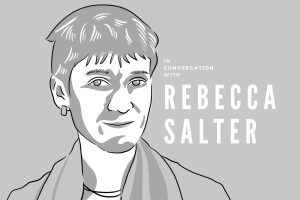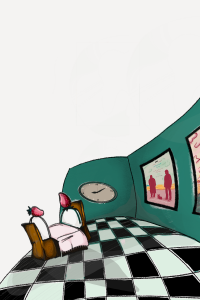“Psychedelics can be life-changing compounds.” Icon of the Week: Rebecca Smausz
by Mina Yücelen | March 4, 2024
Rebecca and I walk around for a bit, trying to find the best place to have our conversation. Being Balliolites, we stick to its vicinity. We try the JCR at first — but there seems to be a Balliol Left Caucus meeting. The light spills out from the windows of a pub with a horse painted in the front (familiar?). “I haven’t been inside this pub yet,” I tell her. She lets me know that it can be quite cosy. Ambient lighting, quiet chatter. Someone reading. This will do. We find ourselves a table in the corner and get a glass of wine.
In her own words, Rebecca Smausz is a “second-year DPhil student in Experimental Psychology. [Her] current project is on how dopamine and serotonin neurotransmitters may interact in shaping flexible decision-making processes.” And how does she intersect with the area of psychedelics, you may ask? Her BSc in Neuroscience (University of Manchester) thesis and follow-up summer internship focused on investigating the effects underlying psilocybin’s therapeutic potential. “Psilocybin is a psychedelic compound naturally found in over 200 species of mushrooms. Like most classic psychedelics, it mainly acts via the serotonin pathways, but may also have some effect on dopamine signalling in the brain.” However, Rebecca tells me that “Dopamine and serotonin neurotransmitters, even in the ‘healthy’ day-to-day brain should be understood before we see how they are impacted by psychedelics”. And she does exactly that — she changed gears to examine the relationship between these neurotransmitters during her PhD.
Rebecca immediately launches into the therapeutic potential of psychedelics – and her eyes light up; “Particularly psilocybin has great therapeutic potential” she says, and repeats this statement throughout our interview – “psilocybin has been shown to help with treatment-resisting depression” for the “40% of the population” for whom “nothing really works”.
“But psilocybin did.”
She says that, after the trial had been done, those with treatment-resistant depression were “still in remission 6 months later…only 2 doses helped for after 6 months after when nothing else had worked.”
When one says the word “psychedelics” the first image that comes to mind usually isn’t therapeutic use — but perhaps, it is an image of fun visuals and laughter. Maybe it’s in Amsterdam. Or an image of psychosis. A point of no mental return. Regardless of what psychedelics might initially remind you of, there is so much more to them. In Rebecca’s words, “Humanity has been using them for millennia as part of some of the most important rituals of the community. Many psychedelics are natural compounds which make us feel more connected to nature and each other. Wouldn’t it be a shame to cut off this deeply rooted connection?”
Yet, something always seems to disrupt this starry-eyed view of psychedelics as compounds of immense potential and history. They are, at the end of the day, Class A drugs. Drugs. Such an emotionally weighted word. I ask Rebecca whether she believes that there is censorship and inhibition in the world of scientific research.
“Well, it’s all problematic at the moment because they are all classified as Schedule 1 — the most tightly controlled drug category in the UK and it actually literally means ‘no therapeutic potential, max abuse potential’ which is plainly wrong – on the contrary, they actually have anti-tobacco and anti-alcohol addiction properties. Regardless, their current scheduling has hindered research for a long time.”
Rebecca identifies a lull in psychedelic research after a boom in interest in the ’60s. “From mid-90s research started reappearing though the laws had not changed all that much. Scientists were really pushing for it.” What about now? Psychedelics remain as Schedule 1 drugs but Rebecca makes a very interesting point: “Turns out only two organizations currently have a licence to produce it: one is Compass Pathways in London, while the other is a non-profit, namely the Usona Institute in the States. So now all research relies on them for the compounds.” Rebecca has also alerted me to the existence of an article which talks about Usona’s greater transparency in relation to the sharing of its protocols and information (compared to Compass), a link to which is given below.
I was shocked to learn of this — a monopoly in an area which involved “magic mushrooms” (which I found hard to conceptualize in a corporate environment when I was, on some level, still convinced that all the researchers were passionate about nature, had long hair, and wore colourful trousers). “Monopoly is almost always dangerous. They can decide who they collaborate with, and have a big say in the scientific questions to be pursued as well. This runs the risk of the company’s interests interfering with the actual science.”
The limitations imposed on psychedelic research make themselves glaringly obvious. Yet, Rebecca adds a more hopeful note: “I think we are going in the right direction, because in Australia recently they decriminalized it and approved it for medical use which will make research easier … and hopefully others will follow suit.”
Rebecca also points out the ways in which psychedelic research is changing our very understanding of how the brain works: “People thought that there were no new brain cells which were produced after a certain age — and no new connections. But now we know that there can be some neurogenesis (which in Latin means the ‘birth of neurons’) in the hippocampus (the brain region involved in memory processing) and in the prefrontal cortex. Also, it is now clear that the adult brain is also ‘plastic’ — it can change the number and configuration of its neuronal connections based on experience. Psychedelics are remarkable because they open a window of neuroplasticity — they increase the potential to make new connections between neurons. And this is how we think they might act in the case of depression for example— that you are quoting these loops like ‘this is how the world works, this is how I am, I will never get better and will never be appreciated, and this is completely bleak and there is no hope’ and what psychedelics do is that they take you out of it and give you a new perspective. And it is not just that you had the insight and it is gone — but you have the physical means of rewiring the brain and making the neural connections to keep the insights and emotional breakthroughs and see ‘actually there is hope, there are other ways of tackling this problem, and that everything is interconnected’ that you are not alone in your suffering. That even a connection with nature can be beautiful.”
I find that both Rebecca and I repeat the word “beautiful” while talking about psychedelics at different points during our conversation. That makes for an interesting realization. I then ask Rebecca about “psychedelics in Oxford” — how she finds the attitudes to be in general, and we cannot avoid mentioning Oxford’s very own Psychedelic Society. “I was super excited to see when I came to Oxford, that there was a psychedelic society. I went to most of their events. It’s wonderful that they have such a wide range of speakers and want to present views from all sides. They had members of the parliament, journalists, scientists and even shamans from the Amazon — elders from the Yawanawá tribe.” Rebecca then went on to expand on that event in particular, expressing her initial reservations and thoughts about the sharing of hard-earned and colonially repressed indigenous knowledge on Psychedelics with the “West”. I could see that that talk had impacted her deeply. “Initially, I was a bit sceptical because why would these people come to Western civilizations who destroyed their culture… why would they want to share their deepest knowledge about Ayahuasca and how it works, the ceremony etc.?”
“Their communities are kind of dying”, with less interest among young people in that “way of living… this was one way to call them back, and show to the world that they have something valuable that they have known for years and years and for generations — on how to hold the ceremonies — and they wanted to share this insight…” they wanted to make sure that more people knew about the particularities of a ceremony as “for psychedelics the ‘set’ and ‘setting’ are crucial. Set as in the particular mindset you are in — how you are feeling and what problems you may be dealing with; and setting as in what’s around you. It is really important to have both in a good way. And this is what the elders are perfecting with trial and error over generations — and these people came and actually shared this with us.” And there it was again: “It was really beautiful.”
“The president of the society, Kenneth Shinozuka, and Prof. Morten Kringelbach the professor coordinating this, as well as the people from the society’s committee — really marvellous people, actually the whole community, I am grateful to them for reaching out to these people and enabling them to come to Oxford to have these discussions.” She went on to stress the diversity of opinions that they had made space for with their events: “In addition to these, we had some users who had bad experiences — it happens now and again for different reasons, for example, if you have schizophrenia running in your family it can be dangerous to take psychedelics because they might trigger a psychotic episode. These compounds are not to be taken lightly — set and setting have a huge influence on how one’s experience will be. We had some people who shared their negative experiences and some people who shared their exhilarating experiences … journalists arguing that it was a disaster for the population at the moment, we had MPs arguing otherwise — so trying to bring in all kinds of views from both the scientific aspect as well as the more alternative phenomenological, experimental side.”
The very space that the Oxford University Psychedelic Society creates for the discussion of psychedelics has a greater impact. “The psychedelic society gives the opportunity for very interesting people to share their insights and views and this is the only way to go forward, see how things are and stimulate more research and curiosity about how they work — so I am very happy about the fact that this society exists.” She encourages everyone who can to check out their events.
Psychedelics seem to be very personal compounds. Rebecca and I continue to talk — forgetting the premise of the interview. It is very interesting how versatile they are — how you can discuss therapeutic uses and development in treatments and connection to people and nature as well as intense self-discovery in the same breath. Psychedelics are trees and synaesthesia and lab coats and experiments. We return to the interview — knowing a bit more about each other as people than we did before. Rebecca did an in-depth literature review “about the mechanisms underlying psilocybin’s therapeutic potential” — and when I ask her what requires more focus in the scientific realm of psilocybin research, her answer is unsurprisingly “the mechanistic side of it. Right now, we have empirical evidence that psychedelics help psychological conditions and for people in a crisis they can brighten up things— but we don’t really know how they work on a receptor level, circuit level, long-term plasticity… We have some evidence but it’s not enough. There are not many pre-clinical studies on this, as in, animal research, which is key for elucidating mechanisms of action.” Rebecca suggests that if we understand the mechanisms of psilocybin’s influence in the brain, then perhaps we can “design a compound with a similar structure to induce the long-term psychological benefits without the perceptual alterations or emotional turmoil often present during a classic psychedelic experience. If such a compound would induce an increase in plasticity — the formation of novel connection between neurons — without visual alterations etc. — maybe it could still keep its potential in treating depression and anxiety… That would be very important as we cannot safely administer psychedelics to people with schizophrenia running in their families and other personality disorders.”
Understanding the underlying mechanisms of psychedelics can allow for their greater use in treatments — by potentially decreasing the possibility of psychosis faced by vulnerable people with a history or genealogy of mental health issues. “It would be really good to determine the mechanisms…figure out a way for everyone to benefit.” Yet Rebecca also highlights the “value in that psychological struggle [in psychedelic-induced trips] … Sometimes even with bad trips — you can learn so much from them. It is very important to get out of your usual ways. Someone made this comparison on how psychedelics act in the brain: the more time that goes by the more established the model so on how everything works and how you function and these tracks are like on a snowy mountain. When you ski down you have these tracks. The more you ski down these same tracks, they will get deeper. Psychedelics are like a snowstorm. Covering all the tracks with fresh snow— everything is all white again. So you can ski down different tracks and not always on the same old paths that led you into ditches. Now you have the freedom to go for a new perspective and approach.” The analogy seems apt knowing that Rebecca just came back from a ski trip (and that her favourite colour is the dark blue hue of the sky against a snowy mountain).
I don’t know if you have come across them — but I keep seeing short-form content of people micro-dosing on magic mushrooms. Videos with brightening and sparkling filters on them filled with shots of incense smoke and layered jewellery. Bonus points for that white maxi skirt. The rise of “spiritual TikTok” has been a much-discussed topic (well, at least in the parts of the internet that I seem to be exposed to). I wonder what Rebecca has to say about this daily and often romanticised use of psychedelics by the general public: “Micro-dosing is still kind of a debate but there was a big paper in a very influential journal which showed that most of those effects are down to placebo”, but she also reminds me to not underestimate the effects of placebos, “the placebo effect is really strong”, and promptly questions how we can, if at all, differentiate between the actual effects of a drug or the psychological results of the placebo effect.
So, can psychedelics be abused? “Because we already have compounds such as nicotine and alcohol that can be and are being used for escapism. I mean, one good thing about psychedelics is that they aren’t addictive. It’s a pretty intense trip that you really wouldn’t be doing every day. Because it is really draining and quite hard and you need to think about it — and you don’t want to be thinking about your problems all the time.”
Some reservations and caveats still come up with the topic of their legalization — “I think if they would be legalized with a lot of information and campaigns to inform people about how they should be used and dangers… and everything we know about how to create an optimal setting and how to prepare for the experience — I think it would be fine. Because now, most people that really want them can get them from the black market — and it’s so much worse when you don’t know what you are getting and how it might affect your health more violently because maybe they are mixed with other things.” I can never seem to be able to write an article without hearing the echoes of yet another one of my mother’s Turkish sayings — those who seek it, find it. “I think most people are not trying to destroy themselves but are using them to better themselves — and the people who would use them otherwise would abuse anything after all — but for those who could be at risk they should be properly informed.”
She mentions that “Prof. David Nutt from Imperial College has been pushing for the legalization of psychedelics and cannabis and all these compounds with little addictive potential and huge therapeutic one — even for regular people as everyone struggles and everyone is down at times and sometimes, rather than being stuck somewhere, it’s better to help with anything that works, really.” She smiles while she says the next few sentences: “Honestly, alcohol is one of the worst things that are out there. It is via tradition — but it creates violence and causes so much money and time loss. It is quite hard to be violent with psychedelics” I interject, raising my wine glass, and she starts laughing. “Cheers, I guess”, our glasses clink in the now-crowded pub.
I decide to end the interview with hopes and dreams about the future, and of course, Rebecca’s first wish is that “They should get out of Schedule 1 — maybe not directly legalized, but at least Schedule 3 or 4 so that research can go on. That’s very important.” When I ask her about any changes that she wants to see in the Oxford psychedelic circles she says that “on the more social aspect, I think that it could be good for psychedelics societies to have exchanges between universities” but she makes it clear that “Honestly, Oxford is doing so much— sharing information, bringing interesting and informed people into the conversation.” Rebecca goes on to identify Zurich (“In Zurich, there is a big centre led by Franz X Vollenweider, Katrin H Preller”) and Imperial to be good exemplary centres for psychedelic research and discussion “but Oxford is really good as well. I am very happy”.
So, psychedelics? Rebecca believes that “they can be life-changing compounds… They are a wonderful opportunity to break those old habits and old models and look at the world differently through child-like eyes, through more hope and curiosity.” And perhaps a more contested final statement to leave with you, dearest reader: “Everyone who doesn’t have a serious health condition should be entitled at some point to try them — because they can be life-changing. Something from all the reports — you can’t really describe… The only way to see exactly how they work is through direct lived experience.”
“I hope that we can improve everyone’s wellbeing — well, with whatever we can, but these compounds also seem super promising. It is a good place to start.”∎
Words by Mina Yücelen.




